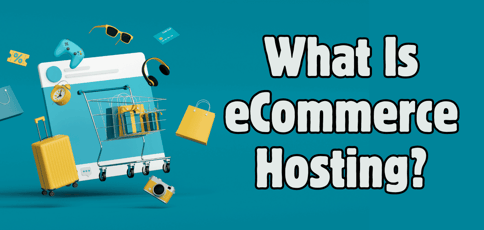
The term eCommerce hosting refers to a type of web hosting service that caters to eCommerce businesses with online stores as websites. Hosting companies often offer special eCommerce hosting packages with eCommerce-specific tools added to their basic web hosting features.
Some of these additions may include SSL certificates for keeping transactions secure, pre-installed shopping cart software, payment processing tools, and upgrades to processing and storage.
These eCommerce hosting plans are essential for online stores that want to maintain high levels of performance, security, and user-friendliness. For instance, online stores must ensure fast page loads since online shoppers may leave the website if it takes too long. Overall, eCommerce hosting helps all sizes of online stores improve sales and build their brands behind reliability and security.
-
Navigate This Article:
The Role of eCommerce Hosting
From security for transaction-heavy stores to speedy checkout systems, eCommerce hosting has a significant role to play in the world of digital commerce. Learn about it below to decide if eCommerce hosting is right for your organization.
Online Stores and eCommerce Hosting
When attaching eCommerce hosting to an online store, businesses obtain the necessary tools to run the backend of a store without any issues. Small stores can handle technical elements like store building and secure transactions, while larger stores can scale rapidly while maintaining excellent performance.
Key Features and Requirements
Although every eCommerce hosting company offers unique tools, there are some key features to look for when testing eCommerce hosts. Ensure most of these are available with your eCommerce hosting provider:
- Security: Protection elements like SSL certificates, DDoS protection, automated site backups, and built-in firewalls make everything from transactions to customer data safe.
- Scalability: Multiple eCommerce hosting plans allow businesses to upgrade during growth periods. It’s essential to have a host that offers options to increase storage space and processing speeds to accommodate boosts in traffic and data storage.
- Performance: Features such as caching, SSD storage, and CDNs (content delivery networks) ensure that online stores load pages and content quickly. This helps keep the shopping experience fluid, ultimately increasing sales and happy customers.
- Site building: From eCommerce-oriented WordPress themes to website builders, it’s nice to see eCommerce hosts with tools to help design online stores.
- Business email: A custom domain often comes with hosting, so why not add that domain to an email address for the most professional communications possible?
- Payment processing: Sometimes, this comes with your content management system or website builder, but many hosts offer shopping cart software and payment processing tools to accept credit cards, digital wallets, and even alternative forms of payment like cryptocurrency.
- Customer support: It’s essential to have reliable customer support when signing up for eCommerce hosting. An issue with an online store could mean lost sales, so you want someone to resolve problems quickly.
Remember, some hosts may call these key features something else, or they might have something different altogether. Keep an eye out for features that either meet the benchmarks above or provide more advanced technology. For instance, seeing “NVMe SSD storage” is actually an upgrade with faster storage speeds.
Types of eCommerce Hosting
There is a wide range of hosting solutions tailored for eCommerce stores. Starting with the most basic, shared hosting, then going all the way to robust dedicated hosting solutions, we outline all your options in detail.
Shared Hosting
Shared eCommerce hosting is the most economical form of hosting available for online stores. It caters to small and midsize stores but offers the potential to grow.
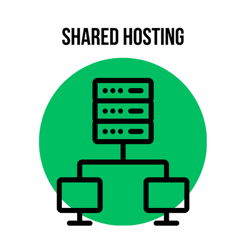
From the technical side, shared hosting puts your website on a shared server with hundreds or thousands of other sites. All those sites share the server’s resources.
Shared eCommerce hosting plans typically include essentials like shopping cart tools, SSL certificates, website backups, firewalls, and payment processing tools.
One downside to shared hosting, which usually isn’t an issue for small to midsize stores, is that other sites can affect your website’s performance since the server resources get shared with other users.
WordPress Hosting
WordPress hosting for eCommerce stores is usually the same thing as shared hosting but with added features for building a store on the WordPress content management system.
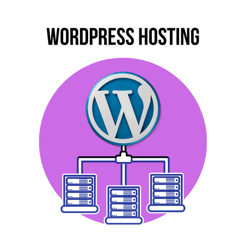
You receive a pre-installed version of WordPress and WooCommerce (an eCommerce plugin for WordPress).
WordPress plans often have managed WordPress services so you never have to update plugins or the WordPress system.
Sometimes WordPress hosting offers VPS or cloud hosting (instead of shared hosting) for improved performance. These types of WordPress plans are ideal for larger, high-traffic eCommerce websites.
VPS Hosting
VPS (virtual private server) hosting delivers a sectioned-off server so that every user gets their own portion. Since other users don’t share the same resources, this leads to improved performance and customization.
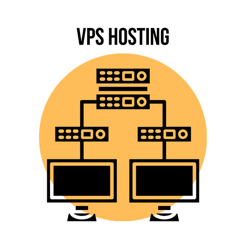
For eCommerce stores, VPS hosting also offers increased storage and bandwidth, along with root access to the server for managing and customizing website files.
VPS hosting serves as a suitable choice for online stores that outgrow shared hosting.
Many small eCommerce shops also skip shared hosting because of the performance improvements found with a virtual private server.
Cloud Hosting
Cloud hosting is like VPS hosting (in that it provides a virtualized server away from other users), except that it works on a network of servers.
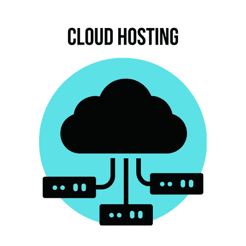
This means that multiple servers provide processing and storage resources to your website. If one fails or struggles, the other ones jump in to help.
A setup like this leads to more redundancy, fewer site crashes, and higher performance thanks to the network of servers all working together.
Companies are turning to cloud hosting over VPS hosting because of its redundancy (VPS hosting only uses one server). And cloud hosting often has similar pricing to a virtual private server.
Dedicated Hosting
As the priciest form of eCommerce hosting, dedicated hosting gives its users an entire server dedicated to one online store. Therefore, all of its resources work to power a single website.
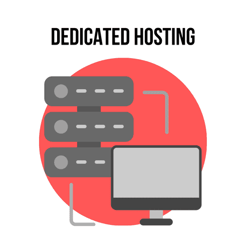
This leads to superior performance and storage but also comes with higher costs and the need for someone in the organization to manage the server. Another benefit of dedicated hosting is full customization of its operating system and components.
Large enterprises typically opt for dedicated servers, but growing online stores might choose a dedicated server for its security benefits.
Having said that, cloud hosting often offers an economical advantage with similar performance.
How to Choose the Right eCommerce Hosting Provider
To choose the right eCommerce hosting provider, you must first look into your business needs. Are you a fledgling startup with a limited budget? Do you expect boosts in traffic during certain seasons? These questions come into play when choosing a hosting provider. After that, you can dive into your research and explore the most popular hosting platforms available.
Assess Your Business Needs
Read through this list to brainstorm your business needs and understand which hosting options may fit your business best.
- Budget: Determine the overall budget you can dedicate to eCommerce hosting. Considering that your online store serves as the main hub for making sales, it warrants a larger percentage of your budget. Shared hosting works for smaller stores, but think about options like VPS, cloud, and dedicated hosting to avoid issues with performance and storage.
- Scalability: Think about the rate of your business’s growth. If it’s fast, you’ll want an eCommerce hosting provider with flexible pricing plans or multiple plans that support much larger businesses.
- Product collection: Larger product collections require more pages, more pictures, more videos, and more content. That means you need adequate storage space to hold all that data and enough processing power to serve up heavy website files.
- Traffic: Estimate how much traffic your store can expect. Consider high-performance, high-bandwidth, and high-storage hosting if you expect seasonal surges in traffic or consistently high levels.
- Security: How much security does your store require? Most eCommerce shops handle sensitive customer data, requiring security measures like SSL certificates and PCI-compliant shopping carts.
Make your assessments based on comparables from other businesses in the industry, and use as much actual data as opposed to making guesses about the future of your business. The last thing you want is to spend too much on hosting or find that your shared hosting account can’t handle your site’s traffic.
Research Hosting Providers
When researching potential hosting providers for your eCommerce store, it’s important to check more than just the price and features. Aspects like uptime and customer support play a significant role in your choice as well. Below, find tips for researching and comparing eCommerce hosting providers.
- Assess scalability type: Does the provider offer set pricing plans? If so, that’s acceptable, but make sure the upgrades fit what your company plans to achieve. And ensure there are enough plans to grow consistently into the future.
- Read real user reviews: The testimonials on a hosting provider’s website don’t count. Seek real reviews from other eCommerce brands using the service by going to review websites and forums.
- Check for uptime guarantees: Sometimes, the uptime guarantee sits right on the homepage, but other times, you have to go digging (or even ask the support team for it). More often than not, you can find the uptime guarantee within the provider’s service level agreement (SLA).
- Make an inventory of security measures: Security measures often get overlooked when users search for eCommerce hosting companies. Be sure to take an inventory of each potential host, then compare them side-by-side. This allows you to see if one host is missing a few features like DDoS protection or free SSL certificates.
- Test out the customer support: It’s one thing to read from the provider’s website that it has “24/7 customer support.” The question is whether the customer support is any good. You’d rather have high-quality customer support that’s only available during business hours than someone you can reach in the middle of the night who reads from a script. To assess, actually test out the customer support methods. Call the phone line, send in a tough question through the ticketing system, and try out the live chat box.
- Figure out the type of hosting and eCommerce features: Some hosts like to provide basic shared hosting and simply put an “eCommerce hosting” label on it. First off, figure out if the hosting is shared, VPS, or cloud hosting. Next, look for eCommerce-specific features like payment gateway support, shopping cart software integrations, and security measures you can’t find with regular shared hosting.
These factors will help guide you in locating the ideal eCommerce hosting provider based on factors like security, scalability, and support. If you need a list to start your search, check out some of the most popular eCommerce hosting platforms below.
Popular eCommerce Hosting Platforms
Start your search by examining the most popular hosting companies. This ensures the providers have a reputation and keep a thoughtful eye on what’s needed to run eCommerce stores smoothly.

Here are the top eCommerce hosting providers by market share:
- Shopify: Shopify boasts 26% of the market share. It’s the platform of choice for midsize to large organizations wanting premium features and customization. Shopify’s plans are more expensive than its competitors, but you get access to a world-class online store builder with more than 8,000 apps and integrations.
- WooCommerce: WooCommerce holds a 20% market share and is responsible for more than 3.6 million online stores. The platform is best known for its compatibility with WordPress as a free, open-source plugin. Users can purchase a WooCommerce hosting plan from any reputable hosting provider and get started in minutes. Some of the software’s best features include nearly 850 extensions and almost 100 ready-made website templates.
- Squarespace: Squarespace is the third leading eCommerce platform, with a 15% market share. The platform is ideal for beginners and offers cheaper pricing than Shopify’s basic plan. You can use the platform’s website builder to make a custom online store in little to no time.
Other popular eCommerce platforms by market share include Wix (14%), Ecwid (6%), Opencart (1.9%), and Prestashop (1.5%).
Essential Features of eCommerce Hosting
The most important features of any eCommerce provider revolve around security, performance, and scalability. Review these essential features with each potential hosting provider to ensure it works for your business.
Security Measures
Reputable eCommerce hosting plans include robust security features like data encryption through SSL certificates. Security measures like this are non-negotiable during your search for a hosting company. Other elements to look for are DDoS protection, threat monitoring, and backups in case a security breach should occur.
Performance Optimization
Performance optimization plays a monumental role in any eCommerce operation. If customers experience slow loading times, your sales will suffer. That’s why you need a hosting company and a plan with respectable performance. Seek hosts with CDNs (content delivery networks) to deliver content quickly to users around the globe. Also, look for hosts with website speed and optimization tools, caching elements, and high-performance servers.
Scalability and Flexibility
The ideal eCommerce host offers scalability and flexibility in its hosting plans. The goal is to accommodate for growth while also planning for seasonal fluctuations in traffic. Some technical elements to look for include load balancing and resource scaling. Otherwise, you want a host with upgradeable plans or flexibility in resource usage.
Setting Up Your eCommerce Store
Ideally, your eCommerce hosting company assists in migrating or configuring your online store, whether that’s on shared, VPS, cloud, or dedicated servers. But the best setup for your store relies mostly on your efforts. Here are the primary steps to configure an eCommerce shop the right way.
Domain Registration and Setup
A domain name serves as the online address of your eCommerce store. Make it relevant to your business, catchy enough for customers to remember, and short and simple enough to minimize confusion.
You can purchase and register a domain name with your hosting company or any domain name registrar. Each registrar has unique instructions to direct that domain to the eCommerce hosting provider. After pointing the domain to your host, customers can access the website from the domain name.
Installing eCommerce Platforms
The process of installing an eCommerce platform varies based on the type you choose. Some, like WooCommerce or Magento, are self-hosted, meaning you must install the platform on your hosting servers (a simple process with the right host).
Others, like Shopify and BigCommerce, offer a streamlined installation process where you simply pay for a subscription, and it gives you everything (like a website builder and hosting) under one roof.
Here are the steps to install WordPress and WooCommerce through the A2 Hosting cPanel dashboard:
- Log into the cPanel dashboard (in this case, through A2 Hosting). All hosting providers have some sort of hosting dashboard, most commonly cPanel.
- Click on the WordPress Toolkit button. Most hosts have a one-click WordPress installation button on the dashboard.

- Under the Installations tab, click the Install button.
- Fill in installation settings like your website title, WordPress version, and preferred login credentials. After that, click the Install button.
- Many eCommerce hosts like A2 Hosting offer the option to install extra plugins. Others already have WooCommerce installed. If you get prompted to add more plugins, choose the Install Plugins button, then install WooCommerce.
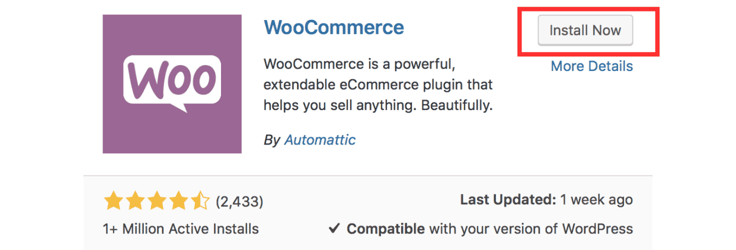
- If you didn’t get the choice to install WooCommerce during the WordPress installation, complete that process by logging into the WordPress dashboard. Go to Plugins > Add New Plugin. Type in “WooCommerce” and click on the Install Now button next to the WooCommerce plugin. Make sure you activate the plugin, too.

Now you have both WordPress and WooCommerce installed on your hosting server. Walk through the WooCommerce configuration process in WordPress to add products, set up shipping details, and design your store.
Customization and Configuration
With your eCommerce platform installed, it’s time to customize your store design and configure logistical elements. Begin by customizing the look of your site. Pick a theme that fits your brand image. Then, add products with high-quality images. Write detailed and inviting descriptions to explain the products. It’s also important to configure your payment gateway, shipping settings, and tax settings.
Managing and Maintaining Your eCommerce Hosting Plan
An eCommerce hosting plan, although many times offered as a managed hosting solution, still requires management and maintenance from the eCommerce business itself. Here are ways to manage that process effectively:
- Conduct regular backups: The best eCommerce hosting plans offer automated backups. Make sure these are on and you know the location of those backups. The next step is understanding the backup restoration process. This should get handled with the click of a button, and you must know exactly how it works to minimize downtime after a security breach.
- Perform security updates and patches: Implement all security updates and patches released by your eCommerce hosting company. Sometimes the hosting provider installs these updates for you. Regardless, it’s important to ensure they’re running.
- Monitor and optimize site performance: Every aspect of performance monitoring and optimization helps guarantee a seamless user experience and increased sales. Monitoring efforts include checks for uptime, loading speed, and performance. Optimization tactics include using a CDN (content delivery network), browser caching, and image optimizer.
Managing your hosting plan with regular backups, security updates, and performance optimization sets you on the right path to a reliable hosting experience.
Common Challenges in Maintaining eCommerce Hosting
Challenges in eCommerce hosting include monitoring uptime, speed, and downtime. Ensure your hosting provider has a user-friendly interface and direct access to evaluate each. Two other challenges involve scalability and security. Some hosts lack the resources for proper scaling, while others cut corners on security measures. A reputable host helps grow your business without downtime, and it handles security monitoring and remediation itself.
Scaling Your eCommerce Business
Scaling an eCommerce business requires scaling strategies, upgraded hosting plans, and leveraging analytics. These steps allow online stores to prepare for the future and anticipate growth long before hosting solutions fail to support it.
Scaling Strategies
Scaling any eCommerce business requires planning. Several scaling strategies come into play when completing this process. For instance, it’s wise to expand product offerings to bring in new revenue streams.
Businesses should optimize marketing campaigns, too, embracing data analysis to improve conversion rates and overall sales. Finally, the targeting of new markets delivers a fresh customer base to accumulate more sales and spread the brand to other parts of the world — especially considering the rapidly growing global eCommerce market expected to reach $8.148 trillion in sales by 2026.
Upgrading Hosting Plans
Upgrading your hosting plan plays a significant role in scaling an eCommerce business. A suitable eCommerce hosting plan often separates your online store from other websites instead of sharing one server.
Scalable hosting also provides flexible resources for traffic surges, upgradeable plans, and ways to improve site reliability.
Leveraging Analytics
Analytics minimize the reliance on blind decisions and gut feelings. This is useful for eCommerce stores, considering analytics provide looks into key performance metrics and tracking.
You can then forecast sales, optimize marketing strategies, and find growth opportunities that lead to increased profitability.
Case Studies
To help you choose the best eCommerce hosting provider or migrate to a new host, explore these real-world examples of successful eCommerce businesses and how they chose their hosting solutions.
Case Study 1: Deer Stags
Deer Stags, a maker of flexible, deerskin dress shoes for men, decided to put much of its focus on eCommerce after decades of selling from retail stores.
It saw issues with its initial hosting provider, seeing how it had only one point of failure and limited options to scale. After signing up for Liquid Web’s eCommerce hosting and its high-availability KVM/cPanel, Deer Stags saw improvements in uptime, scalability, and user-friendliness.
Key Takeaways
- It’s best to find a provider that assists in the migration from another hosting provider.
- Make scalability a priority to avoid switching to another host in the future.
- The control panel is important since someone in your organization will have to manage the hosting side of your business.
- It’s possible to find high uptime levels and performance at a reasonable cost.
Traffic spikes have caused many issues for Deer Stags in the past. But with the change to Liquid Web’s eCommerce hosting, those concerns have gone away.
Case Study 2: Dart Drones
To prepare for its appearance on Shark Tank, Dart Drones (an eCommerce store selling drone training and certification) used Kinsta Hosting’s eCommerce solutions.
This helped them reduce page load times by up to 50% and ensured the website could handle more than 1 million page views by the time the show was over.
Key Takeaways
- Forecasting for traffic spikes is key in finding the perfect hosting provider.
- It’s essential to reduce page load times by using a high-quality eCommerce hosting company. This way, your customers stick around to shop.
- Some hosting companies help resolve PHP bottlenecks causing decreased performance, like how Kinsta fixed these issues common with WordPress sites using its APM tool.
- A surefire way to improve performance is by isolating your store from other sites. You can complete this with cloud, VPS, or dedicated hosting. Kinsta provided this to Dart Drones with its Linux containers on Google Cloud Hosting.
The Dart Drones story is a classic case of a business that prepared for its surge in traffic. By choosing the right eCommerce hosting solution, it was able to handle the inevitable millions of site visitors from its television appearance.
Case Study 3: Burren Smokehouse
Burren Smokehouse, a popular purveyor of smoked salmon in Ireland, signed up for WP Engine’s eCommerce hosting to support the backend infrastructure of its WooCommerce website.
This resulted in a 94% increase in organic traffic, a 40% reduction in bounce rate, and a 174% boost in session duration.
Key Takeaways
- For existing online stores, it’s crucial to find an eCommerce hosting provider that maintains levels of SEO rankings, which WP Engine did.
- A migration from one hosting platform to another requires re-integrating with business tools. Burren Smokehouse still wanted to integrate with inventory control, stock control, and accounting systems, which WP Engine provided.
- A migration between hosting companies often delivers an excellent opportunity to redesign a website, too. Burren seized the opportunity with a completely new website made by Granite Digital and added it to the WP Engine hosting platform.
Burren Smokehouse achieved both a redesign and improved hosting in one transition. It’s an excellent example of how existing businesses can shift to a faster, cleaner, more sale-friendly online store with help from the right designer and eCommerce hosting provider.
Thrive in the Digital Marketplace With eCommerce Hosting
With eCommerce hosting, businesses have a head start implementing the security measures, payment processing, and performance elements required to run a successful online store. Small to large eCommerce businesses should all take advantage of this specific type of hosting to ensure the proper handling of traffic surges, transaction security, and infrastructure building.
We encourage you to use the best practices outlined in this article to find the right eCommerce hosting provider for your needs. If you locate a reputable, high-performance host with all the security and customer support elements in place, you can focus on other parts of your business that boost profits.







